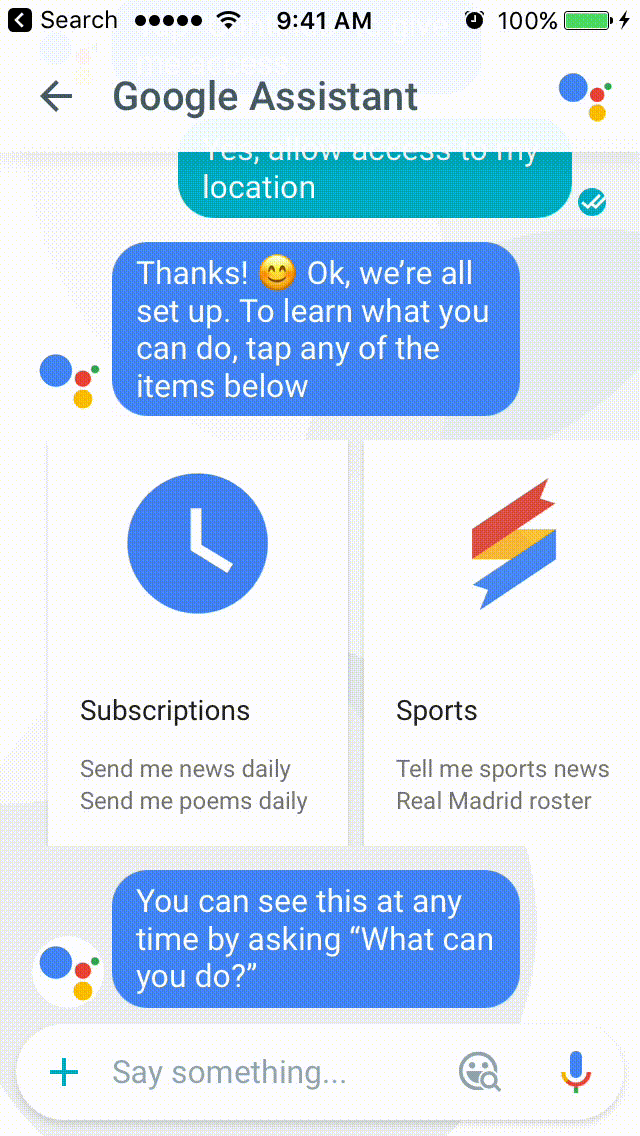Amazon describes Echo as a device that provides “hands-free convenience with voice-control”. But its capabilities go beyond music -- while your tunes (or audiobooks, which it can also read aloud for you) are playing, you can interrupt it to ask a question, and should promptly receive an answer. Google Home Price: $129 Requirements: Android 4.1 and higher, iOS 8 and higher (only available in English and for purchase in the U.S.) Google Home is described as “a voice-activated speaker powered by the Google Assistant.” That’s the same technology used to answer questions in the search engine’s Allo app, which is configured to respond to search queries, set reminders, and engage in everyday chit chat. Amazon Echo Vs. Google Home: 5 Important Distinctions 1) Google Integration Raise your hand if you use Google Calendar. “All the things that I already used Google for, I can now tell Home to maintain.” But that technology isn’t perfect. (Google Home only allows one user, which we’ll get to later.) That’s because Google Home requires lighting commands to be assigned to individual rooms -- so unless users specify, “Turn on the living room lights,” every light in the home is illuminated. If so, Amazon Echo’s music-streaming features might be a better option, especially for Spotify users. The Echo, Shamis says, has a more user-friendly integration with Spotify. Which device do you prefer -- Amazon Echo, or Google Home -- and why?

The answers to those questions depend largely on an individual’s lifestyle, and what’s most important to each user. We had a look at each device, and selected five key differentiators that can help you decide which one is best for you.
First, a Bit About Each Device
Amazon Echo
- Price: $179
- Requirements: Wi-Fi. Compatible with Fire OS, Android, and iOS devices and accessible via web browser.
Amazon describes Echo as a device that provides “hands-free convenience with voice-control”. It’s designed to play music from any number of streaming apps, like Spotify, Pandora, or iHeartRadio, among others. But its capabilities go beyond music — while your tunes (or audiobooks, which it can also read aloud for you) are playing, you can interrupt it to ask a question, and should promptly receive an answer.
Amazon Echo can be used the same way you might use any other type of voice search, and ask for things like news, weather, and information about what’s nearby. It’s powered by Alexa, Amazon’s voice recognition technology, and it’s built for the Internet of Things — or smart home — making it able to control things like room lighting.
Google Home
- Price: $129
- Requirements: Android 4.1 and higher, iOS 8 and higher (only available in English and for purchase in the U.S.)
Google Home is described as “a voice-activated speaker powered by the Google Assistant.” That’s the same technology used to answer questions in the search engine’s Allo app, which is configured to respond to search queries, set reminders, and engage in everyday chit chat. Here’s a look at how the app functions:

But the Google Home device has far more capabilities than Allo. First, you can ask the same questions that you might ask of the app, but in a hands-free, voice-activated manner. Like Alexa, it’s also built for smart home technology, and can control things like lighting or temperature.
What really seems to differentiate Google Home, however, is the fact that it’s built by Google. That changes the way it execute searches — after all, it was created by a company known best for its search engine — and can integrate with the technology you might already use for day-to-day management. Read on — we’ll explain.
Amazon Echo Vs. Google Home: 5 Important Distinctions
1) Google Integration
Raise your hand if you use Google Calendar. Or Google Maps. Or any of Google’s other apps. While we can’t seem to find the total number of users for each of them — and by all means, please let us know if you’ve got ‘em — there’s a good chance that you use them. After all, we use Google Calendar here at HubSpot, and we’re a company of over 1,500.
For that reason, it makes sense that people might like a personal assistant device that readily integrates with the technology they’re already using to manage their schedules and daily routines.
“The real benefit is how it integrates into my Google life — my trips, my calendar, my shopping list,” says HubSpot’s Web Team Tech Lead, Dmitry Shamis. “All the things that I already used Google for, I can now tell Home to maintain.”

But that technology isn’t perfect. According Google Home support, the device can only support the main calendar of the Google account used to set it up. (Google Home only allows one user, which…

COMMENTS